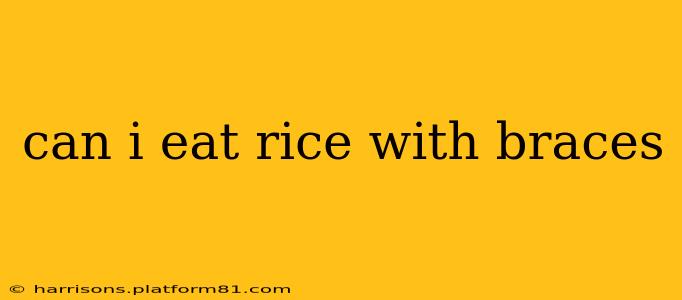Can I Eat Rice With Braces? A Comprehensive Guide
Getting braces is a big step towards a straighter, healthier smile. But with a mouth full of brackets and wires, you might wonder about dietary changes. One common question is: Can I eat rice with braces? The short answer is yes, but with some important caveats. This guide will delve into the specifics, helping you navigate mealtimes with your new orthodontic appliances.
What Kind of Rice? The Texture Matters
The type of rice significantly impacts its brace-friendliness. Fluffy, well-cooked rice poses minimal risk. However, certain rice preparations can be problematic:
- Fluffy White Rice: This is generally safe. Its soft texture is unlikely to damage your braces or get stuck in them.
- Brown Rice: Slightly firmer than white rice, brown rice can still be eaten, but chew thoroughly to prevent large pieces from getting caught.
- Sticky Rice (Glutinous Rice): This is where things get tricky. Sticky rice's adhesive nature makes it prone to clinging to your braces and potentially causing damage or discomfort. It's best to avoid or consume sparingly.
- Fried Rice: The crunchy bits and hard pieces of vegetables or meat in fried rice pose a risk of bending or breaking your braces. Exercise caution, or better yet, avoid it.
Potential Problems with Eating Rice with Braces
While you can eat rice with braces, there are potential issues to be aware of:
- Food Getting Stuck: Sticky rice, in particular, can easily get trapped between your braces and teeth, leading to discomfort and potentially causing plaque buildup.
- Damage to Braces: Hard pieces of rice or other ingredients in rice dishes (like nuts or hard vegetables) can potentially bend or break wires or brackets.
- Increased Risk of Cavities: Food particles trapped in your braces increase the risk of cavities. Thorough brushing and flossing are crucial.
How to Eat Rice Safely with Braces
To minimize risks:
- Cut Larger Pieces: If you choose to eat rice dishes, ensure ingredients are cut into small, manageable pieces.
- Chew Thoroughly: This is crucial for all foods, especially rice. Chewing thoroughly reduces the size of food particles and minimizes the risk of them getting stuck.
- Rinse Your Mouth: After eating, rinse your mouth thoroughly with water to remove any loose food particles.
- Brush and Floss: Meticulous oral hygiene is essential when you have braces. Brush and floss after every meal, paying special attention to areas around your braces.
What About Other Foods?
Many people wonder about other food items alongside rice. Here are a few common questions:
H2: Are there any foods I should avoid completely with braces?
Yes, absolutely. Hard, crunchy foods like hard candies, ice, popcorn, nuts, and certain raw vegetables should be avoided as they can easily damage your braces. Similarly, sticky foods like caramel and taffy can also cause problems. Your orthodontist can provide a more detailed list of foods to avoid.
H2: How often should I visit my orthodontist for checkups while I have braces?
Regular check-ups are vital. Your orthodontist will usually schedule appointments every 4-6 weeks to monitor progress, tighten wires, and ensure everything is going smoothly.
H2: How long will I need to wear braces?
The duration varies greatly depending on individual needs and the complexity of the orthodontic treatment. It can range from a few months to several years.
In Conclusion:
Eating rice with braces is possible, but mindful eating habits are crucial. Opt for softer varieties like fluffy white rice, chew thoroughly, and maintain excellent oral hygiene. Remember, consulting your orthodontist is always the best approach to ensure your braces remain in optimal condition. They can offer personalized advice tailored to your specific situation and dietary preferences.
